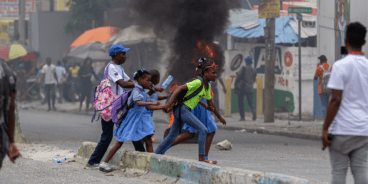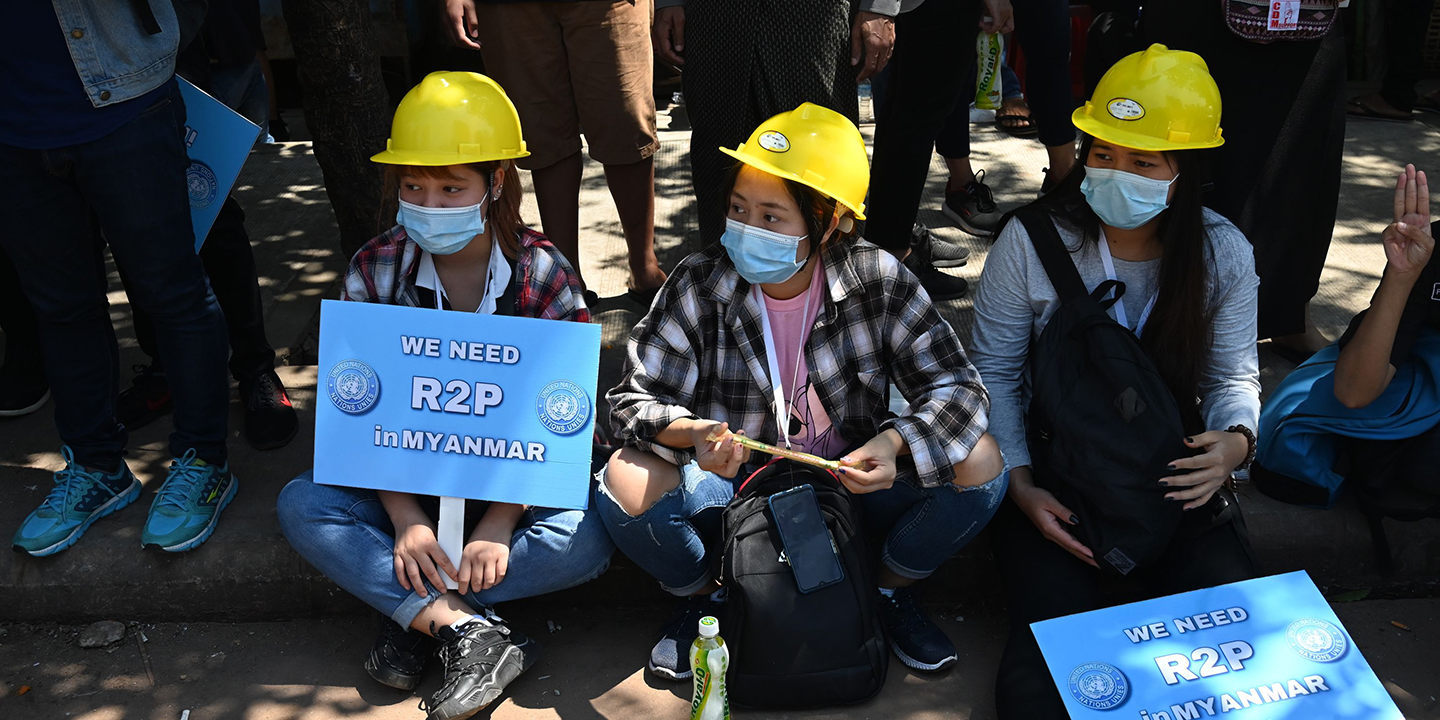

Atrocity Alert No. 243: Myanmar (Burma), Syria and Central African Republic
Atrocity Alert is a weekly publication by the Global Centre for the Responsibility to Protect highlighting situations where populations are at risk of, or are enduring, mass atrocity crimes.
Urgent international action needed to end deadly Myanmar coup
Deadly attacks on peaceful protesters by Myanmar’s security forces continue. More than 60 people have been killed since the 1 February military coup ousted the civilian-led government. At least three protesters were shot dead on Monday, 8 March, in Myitkyina and Pyapon. A local National League for Democracy (NLD) official from Yangon, Khin Maung Latt, died on Sunday, 7 March, after being detained by police. His body reportedly displayed signs of torture. Since then two other NLD officials have also died in custody.
According to the Assistance Association of Political Prisoners, at least 2,008 people have been arrested, charged, or sentenced since the coup took place. Despite the deadly crackdown, daily demonstrations continue in defiance of the military’s state of emergency, and strikes have brought much of Myanmar’s economy to a halt.
On Sunday, 7 March, soldiers occupied and established operation centers in at least 20 universities, schools and hospitals around the country, including in Yangon, Mandalay, Magway, Monywa and Ayeyarwady. The military also continues to block media coverage of the protests and on Monday the junta stripped licenses from five independent media outlets – Myanmar Now, Mizzima, DVB, 7 Days and Khitthit media.
The UN Secretary-General’s Special Envoy on Myanmar, Christine Schraner Burgener, briefed the UN Security Council (UNSC) during a closed meeting on Friday, 5 March. Special Envoy Burgener called for a “robust and timely” response to stop the violence and said that “there is an urgency for collective action. How much more can we allow the Myanmar military to get away with?”
Meanwhile, protesters across Myanmar continue to call for the international community to uphold its responsibility to protect (R2P) and urgently respond to violence by the security forces. Photos continue to emerge on social media showing “We need R2P” and similar messages on protest placards and written in candlelight on city streets. On 4 March the Committee Representing Pyidaungsu Hluttaw, a group of parliamentarians elected during November 2020, sent a letter to UN Secretary-General António Guterres calling on the UNSC to uphold its responsibility to protect, impose robust sanctions on military leaders, enterprises and assets, establish an arms embargo, and bring perpetrators of atrocities to justice.
On Wednesday, 10 March, the UNSC agreed to a Presidential Statement that “stresses the need to uphold democratic institutions and processes, refrain from violence, fully respect human rights and fundamental freedoms.” Despite this call, the UNSC has yet to authorize any practical measures in response to the coup and the deadly violence of Myanmar’s security forces. China, a veto-wielding permanent member of the Council and traditional ally of Myanmar’s Generals, continues to block diplomacy aimed at holding the coup leaders accountable. “The Security Council cannot keep failing the people of Myanmar,” said Nadira Kourt, Program Manager at the Global Centre for the Responsibility to Protect. “There is an imminent risk of further atrocities. Now is the time for decisive action.”
Canada takes steps to hold Syria legally accountable for torture
On 4 March the government of Canada initiated proceedings under the UN Convention against Torture (CAT), in an attempt to hold the Syrian government accountable for its widespread and systematic use of torture. The Canadian government formally requested negotiations regarding evidence of the Syrian government’s crimes and reminded Syria of its obligations under the CAT. Should these negotiations prove unsuccessful, it could potentially lead to proceedings against Syria at the International Court of Justice (ICJ) as Article 30(1) of the CAT provides for dispute settlement between parties under ICJ jurisdiction. Similar steps were initiated by the Netherlands against Syria in September 2020.
The Minister of Foreign Affairs of Canada, Marc Garneau, explained that, “for the last decade, the Syrian regime has inflicted brutal and shocking attacks on its own people. It is our hope that today’s action serves to bring us closer to truth, justice and accountability. The people of Syria deserve nothing less.” The Minister added that, “Syria must answer for its grave breaches of international law.”
According to the Syrian Network for Human Rights, more than 14,500 people have died due to torture since March 2011. The UN Human Rights Council-mandated Commission of Inquiry has also reported on the widespread use of torture in government-run detention facilities, as well as other potential crimes against humanity perpetrated as a matter of state policy, including enforced disappearance, murder and sexual violence.
Despite a decade of atrocities in Syria, UN Security Council vetoes by Russia and China have consistently obstructed efforts to hold perpetrators accountable via a referral to the International Criminal Court. Nevertheless, last month the first criminal trial of a Syrian government intelligence officer was held in Germany, utilizing the legal principle of universal jurisdiction. The historic trial in Koblenz ended with Eyad al-Gharib being sentenced to four years and six months in prison for aiding and abetting 30 cases of crimes against humanity in Syria.
Ten years after the popular uprising against the government first began, the battle to end impunity for torture and other atrocities in Syria continues.
Threat of violence ahead of voting in the Central African Republic
On Sunday, 14 March, people in the Central African Republic (CAR) will return to the polls following an inconclusive and disrupted election in December 2020. Last year an alliance of armed groups, known as the Coalition of Patriots for Change (CPC), launched attacks across the country in order to disrupt voting. The CPC took control of a number of towns, forcing 40 percent of polling places to close due to insecurity. CPC fighters also destroyed ballots, tortured or threatened voters, and attacked troops from the UN peacekeeping mission in CAR (MINUSCA).
Many fear that this Sunday’s vote may spark further violence. Attacks on civilians and humanitarian workers, as well as conflict-related sexual violence, extrajudicial executions and incitement of violence against MINUSCA, have all increased over the past month. The use of child soldiers is also becoming more widespread. Armed groups have recruited almost 3,000 children into their ranks since January.
While government forces have recently recaptured several towns from the CPC and other armed groups, many displaced civilians have not returned due to fear of further fighting. During military offensives against the CPC and other armed groups, the Central African Armed Forces (FACA) and their allies have reportedly perpetrated arbitrary killings, torture and ill-treatment, and arbitrary arrests. The UN Panel of Experts on CAR also documented evidence of FACA perpetrating “systemic violations” against civilians between September-December 2020.
Ahead of Sunday’s vote, Ravina Shamdasani, spokesperson for the UN High Commissioner for Human Rights, emphasized that, “we remind the authorities that security forces must protect civilians, prevent violence and act in conformity with international human rights law and international humanitarian law. Any allegations of violations must be thoroughly, impartially, and effectively investigated, and those responsible must be held accountable. Victims and their families have the right to justice, truth and reparations.”
As pervasive insecurity continues, UN Secretary-General António Guterres has recommended an urgent increase to the number of uniformed peacekeepers in CAR. The UN Security Council should heed this call and strengthen MINUSCA’s capacity to protect civilians.
Related Content


Atrocity Alert No. 434: Sudan, Ethiopia and the UN Human Rights Council
